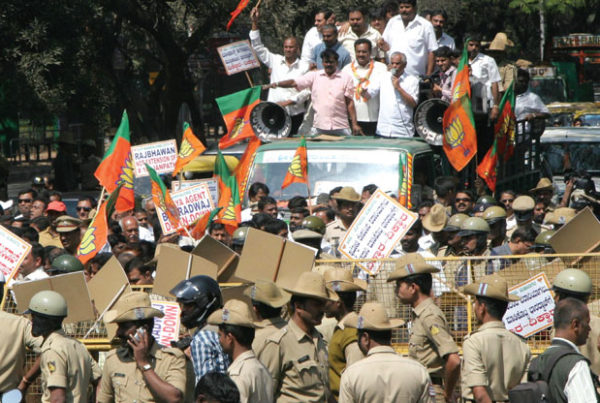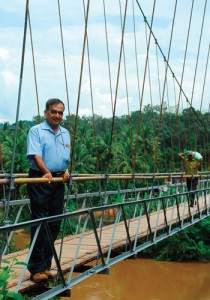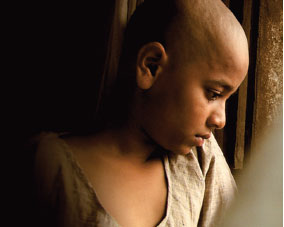A historic moment, or another story of shifting goalposts? Tehelka answers all the pressing queries
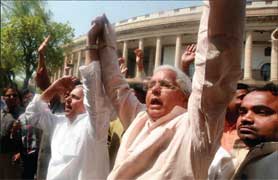 Against the tide? By opposing the Bill, Mulayam Singh and Lalu Yadav have angered those sections of Indian society that want reservation for women to come through
Against the tide? By opposing the Bill, Mulayam Singh and Lalu Yadav have angered those sections of Indian society that want reservation for women to come throughPhoto: REUTERS
Who is opposing the Bill? Why?
Several political parties, academics and even feminists are opposing the Bill. The opposition is ideological — that reservation itself cannot empower women; and technical — that there has not been enough debate on several core features within the Bill. Politically, the strongest opposition has come from allies of the Congress: SP, RJD, and JDU —parties that claim to represent backward castes. They are demanding a sub-quota within the proposed one-thirds reservation, for women from backward castes and minorities, to ensure that the elected women do not have upper caste and urban bias. Though opposition may seem regressive, there are feminists who agree with this viewpoint, arguing that women are not homogenous; that a blanket reservation will only serve the interests of dominant groups. Another bone of contention is that it only allows reservation in the Lok Sabha, not the Rajya Sabha. The Bill also assumes that gender identity will influence decision-making in Parliament, but there is no evidence to back this claim. The different viewpoint emerges not from biological difference, but from an alternative socio-economic experience, naysayers feel. This is why it becomes more urgent to ensure the reservation benefits women from all backgrounds.
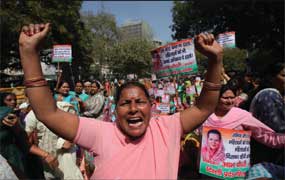 Mother superior For supporters of the Bill, this could be a historic turning point for women’s equality in India
Mother superior For supporters of the Bill, this could be a historic turning point for women’s equality in IndiaPhoto: AP
What are the arguments in favour of the Bill?
Politics in India has traditionally been male-dominated. A survey by the Inter-Parliamentary Union on the number of women in Parliaments ranked India 99 among 140 countries. Pakistan, Bangladesh, Iraq and Rwanda were placed higher. At present, women make up 10 percent of the Lok Sabha. There is a dire need for more women in Indian politics. Proponents of the Bill argue that the quota will bring an unprecedented shift in the face of Parliament, allowing women a larger political platform. It is also a legal mandate that ensures parties to accord political space to women. So far, the record has been abysmal. In Maharashtra, for example, out of 412 candidates who stood for 48 Lok Sabha seats in 2004, only 29 were women. With more women in the apex legislative seat, there is a hope that policy-making will more adequately address their concerns. Displaying rare unity, the Congress, the BJP and the Left have joined to push this Bill, which has been pending for 15 years.
Can’t political parties have internal seat reservation?
A possible alternative to empowering women through reserved seats in Parliament is to mandate that all political parties give a certain percentage of tickets to women. But there is a danger that parties will then give those tickets to women that hold little prospect for the party. Their strongholds will continue to be male-dominated. Also, this may not ensure a certain minimum number of women in Parliament, because women allotted to weaker constituencies may lose.
‘Men — within the house and the political party — have only treated us as housewives. So where was the space for women to discuss political participation?’
KUSUM RAI
Rajya Sabha MP, BJP
Why not reservations within the women’s quota?
The Congress maintains that this Bill is a first step, and not a final step. They say, if it is found that reservation is only bringing a particular group of women into Parliament, then there is the option of a constitutional amendment later. The lack of political will and transparency on why a sub-quota cannot be included in the Bill right now continues to be a major concern. The government’s response to the opposition is that political parties can always issue tickets to backward caste women within this quota. The problem with this argument is that lower caste women who have traditionally not been in the political fray will then be competing with more experienced women candidates and the playing field will not be level.
‘The Bill is not perfect; but at least there is a recognition that political power-sharing in India is a complexity that cannot be ignored anymore’
K AJITHA
President, Anweshi, Women’s Rights Organisation, Kerala
Why does the Bill need further debate?
Some inherent features are seen as a challenge to the core values of democracy. For instance, declaring a particular constituency as a ‘women constituency’ infringes on voters’ right of choice. It forces the voter to choose from a particular group. Further, the Bill allows reserved seats to rotate every 15 years. “This brings democracy without democratic accountability,” says academic Pratap Bhanu Mehta. There is also the view that pitting woman against woman will deradicalise feminist politics in the same way that pitting Dalit against Dalit has de-radicalised caste politics. When a non-Dalit has to choose between two reserved candidates, the perception is that the vote will go to the less radical Dalit. That defeats the purpose of having a Dalit candidate who will stand for hard issues concerning their caste. Feminists fear a similar diluting of political debate if this Bill is passed. An alternative — of two-member constituencies, where one man and one woman are fielded — is being proposed as a better option.
‘Gender equality must begin where laws are made — in Parliament. Why should this bring in only elite women? This is a first step, not the final one’
SALMAN KHURSHID
Lok Sabha MP, Congress
Has 50 percent reservation in panchayats worked?
The current Bill is being seen as a successor to reservation of 50 percent seats for women in panchayats. Supporters, like former Panchayati Raj Minister, Mani Shankar Aiyar, cite the election of 12 lakh women to panchayats across India as proof that reservation for women in political bodies empower women as a whole. He adds that these women are from the most oppressed sections of society. “It has given women rights, politically and socially, and conveyed an important message,” says activist Medha Patkar. Opponents say that an administrative role in panchayats cannot be equated with a legislative position. This requires informed decision-making and, hence, a more nuanced debate.
With bureau inputs from TUSHA MITTAL, SANJANA CHAPPALLI and SHOBHITA NAITHANI
—
This article was originally published in Tehelka, a leading independent news magazine in India, known for its investigative journalism.
